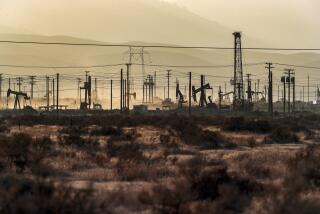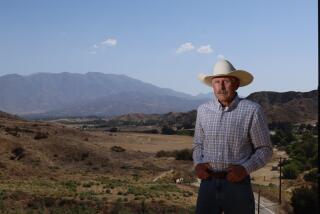L.A. Council Reverses Itself; Trash Runs May Spare Valley
Reversing an earlier decision, the Los Angeles City Council voted Friday to keep open the possibility of expanding Toyon Canyon Landfill in Griffith Park while two of its members look for alternatives to dumping more trash in their northern San Fernando Valley districts.
One alternative being promoted by Councilmen Hal Bernson and Howard Finn is for the city to send 160 daily truckloads of trash to the private BKK Corp. landfill in West Covina.
BKK President Ken Kazarian said Friday that his company is willing to accept some of the city’s trash, but he would not say how much.
Bernson and Finn are desperately looking for new dump sites for the 1,600 tons of refuse a day that now goes to Toyon Canyon. Under city plans, once that dump reaches capacity, about Nov. 1, the trash will be hauled to the Sunshine Canyon Landfill above Granada Hills--in Bernson’s district--and to Lopez Canyon Landfill above Lake View Terrace--in Finn’s district.
Appeal by Bernson, Finn
Bernson and Finn, contending that their districts already receive more than their share of trash, unsuccessfully tried Wednesday to persuade the City Council to leave open the option of expanding Toyon Canyon. But the council instead went ahead with the filing of an environmental impact report, which seemed to close the door on that option.
On Friday, the council unanimously and without discussion rescinded Wednesday’s action and sent the matter back to its Public Works Committee for further consideration.
Councilman Mike Woo, who asked for the reconsideration, said he did so as “as a gesture of good will” to Bernson and Finn. But Woo, whose Hollywood-area district includes part of Griffith Park, said he is opposed to expanding Toyon Canyon. The council, in May, 1984, rejected an expansion in response to objections from environmentalists.
Bernson said his efforts to send some of the city’s trash to the BKK landfill may lead to escalation of the so-called “trash war” between city and county.
City-County Disagreement
After the city’s refusal to allow the county to dump in the now-closed Mission Canyon Landfill on the Westside, the county began trying to prevent the city from disposing of its trash outside city limits.
Bernson predicted that the county will pressure BKK not to take any city trash.
But, he warned, “If they want to play hardball, we might have to play hardball back.” Bernson said the tactics could include trying to prohibit smaller cities, such as Beverly Hills and Santa Monica, from continuing to dump trash at Sunshine Canyon.
Kazarian said BKK is under no pressure from the county to refuse to accept the city’s trash.
“We’re open to the public,” he said.
Question of Price
The major hurdle to any agreement with a private landfill to accept the city’s trash may be the price.
BKK has yet to quote the city a price for taking its trash, Kazarian said. The price, as well as how much trash the company will accept, will be subject to negotiation between the city and the company, he said.
Bernson’s chief deputy, Greig Smith, said it is likely to be more expensive to haul trash to BKK than to Sunshine Canyon because the BKK dump is farther.
But Bernson argued during Wednesday’s debate that “cost is not the issue.” He said the council should be concerned about the fairness of dumping the city’s trash only in the Valley.
Finn has complained that his Northeast Valley district already receives 80% of the city’s garbage.
Del Biagi, the city’s sanitation director, said the Valley receives about 3,000 of Los Angeles’ 5,500 tons of household garbage a day, just slightly more than half. Those figures do not list Toyon Canyon in Griffith Park as part of the Valley and do not include trash from businesses or larger apartment complexes.
Under the city’s existing plan, the Valley’s 3,000-ton share of household trash would rise to 4,600 tons, he said. The trash disposal has prompted complaints from residents near the dumps about noise, odors and traffic created by their operation.
Biagi said Los Angeles produces about 10,000 tons of trash daily from apartments and businesses, which goes to landfills all over the city. No breakdown of the amount going to the Valley was immediately available.
More to Read
Sign up for Essential California
The most important California stories and recommendations in your inbox every morning.
You may occasionally receive promotional content from the Los Angeles Times.










